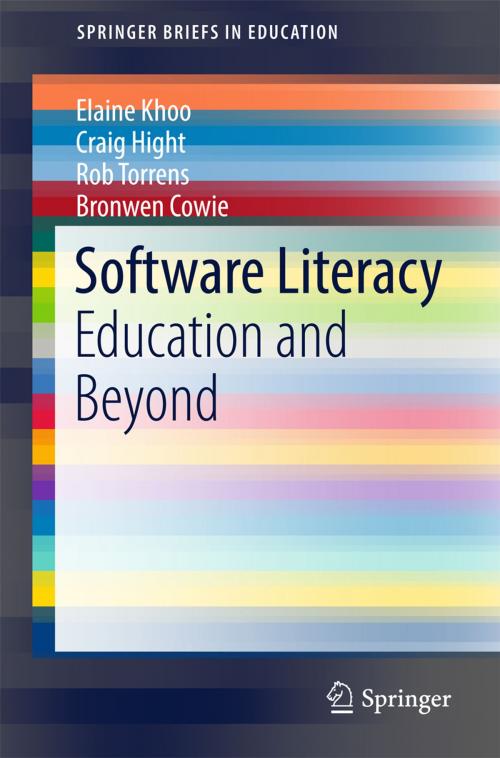Software Literacy
Education and Beyond
Nonfiction, Reference & Language, Education & Teaching, Teaching, Computers & Technology, Higher Education| Author: | Elaine Khoo, Craig Hight, Rob Torrens, Bronwen Cowie | ISBN: | 9789811070594 |
| Publisher: | Springer Singapore | Publication: | November 24, 2017 |
| Imprint: | Springer | Language: | English |
| Author: | Elaine Khoo, Craig Hight, Rob Torrens, Bronwen Cowie |
| ISBN: | 9789811070594 |
| Publisher: | Springer Singapore |
| Publication: | November 24, 2017 |
| Imprint: | Springer |
| Language: | English |
This book explores the notion of software literacy, a key part of digital literacy which all contemporary students and citizens need to understand. Software literacy involves a critical understanding of how the affordances and conceptual approaches of everything from operating systems, creative apps and media editors, to software-based platforms and infrastructures work to inform and shape the ways we think and act. As a cultural artefact, programing code plays a role in reproducing, reinforcing, and augmenting existing cultural practices, as well as generating completely new coded practices. A proposed three-tier framework for software literacy is the focus for a two-year empirical investigation into how tertiary students become more literate about the nature and implications of software they encounter as part of their tertiary studies. Two case studies of software learning and use in university-level engineering and screen & media studies courses are presented, investigating the mapping of students’ trajectory of the learning of desktop applications against this framework for software literacy.
Though the book’s focus is primarily educational, its content also has implications for any field that makes use of software and information & communication technology systems and applications. As such, the book will be of interest to all readers whose work involves the challenges and opportunities presented by software-based teaching and learning; and to those interested in how software impacts the workplace and leisure activities that make up our day-to-day lives.
This book explores the notion of software literacy, a key part of digital literacy which all contemporary students and citizens need to understand. Software literacy involves a critical understanding of how the affordances and conceptual approaches of everything from operating systems, creative apps and media editors, to software-based platforms and infrastructures work to inform and shape the ways we think and act. As a cultural artefact, programing code plays a role in reproducing, reinforcing, and augmenting existing cultural practices, as well as generating completely new coded practices. A proposed three-tier framework for software literacy is the focus for a two-year empirical investigation into how tertiary students become more literate about the nature and implications of software they encounter as part of their tertiary studies. Two case studies of software learning and use in university-level engineering and screen & media studies courses are presented, investigating the mapping of students’ trajectory of the learning of desktop applications against this framework for software literacy.
Though the book’s focus is primarily educational, its content also has implications for any field that makes use of software and information & communication technology systems and applications. As such, the book will be of interest to all readers whose work involves the challenges and opportunities presented by software-based teaching and learning; and to those interested in how software impacts the workplace and leisure activities that make up our day-to-day lives.















